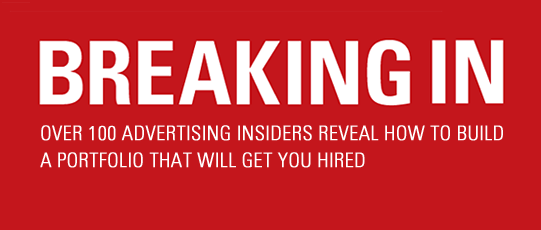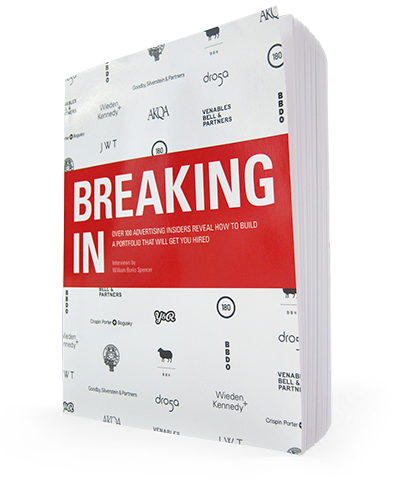If you missed it, check out some of Hemant Jain’s work here.
WS: What do you look for in a student book? And what impresses you?
HJ: I think to say I look for fresh ideas would be a cliché. I look for will power, you know? It’s just so many people…many students who come and say that well, we haven’t had the opportunity to do this or, we haven’t ever had any exposure to advertising or whatever. I don’t really see the merit in that because if you were driven you would produce ideas no matter what. And they don’t have to be ads but they need to be ideas, and they need to be executed. They need to be produced, “I’ve done this, I have done this, I’ve done that,” you know? I don’t want to listen to the odds you’ve faced, I want to see what you’ve done because that’s how I pretty much started. Nobody was giving me an opportunity to work in an agency, and whenever you go to an agency they say, “So what have you done?” And it’s ridiculous because until the time you’re in an agency, you can’t do ads. But what happens to all those twenty years, twenty-five years, twenty-seven years that you spent before joining advertising? What have you got to show for that? Some three poems, four stories, that’s never going to cut it because there are young students who are fifteen years old or seventeen years old or eighteen years old that make fabulous work and [are] producing ideas. Especially in these times where the opportunities and the exposure and the kind of outlets are far too many. You know, you could pretty much make a YouTube video. You don’t have to have experience of being a traditional setup to produce that. You just need a fucking mobile phone camera for all you care, and you can do your film. And in these times, if you’re telling me that you haven’t got the opportunity…sorry, there’s somebody more driven than you because talent is one thing, drive is another. A combination of both is what is going to make you successful.
WS: What do you think about finished work versus sketches?
HJ: See ideas…they’re two criteria on which to judge people. One is ideas. So obviously, sometimes, the ideas would be so fantastic that sketches…forget about sketches, you can just talk about your idea and you can be in. But on the other hand, if you have not only thought about those ideas, you’ve sketched them and you’ve taken time out to produce and you…see, the thing about producing ideas, it’s execution skills. It’s like your designing skills or your filmmaking skills or your editing skills or whatever which really make a difference. Because thinking of ideas is…anybody can think of ideas. But knowing what to do with those ideas is also very important because that’s what it is all about. Somebody thinks of a film and he shoots his YouTube film and puts on the music, puts it on YouTube, you see the finished product, and you say, “Okay, this is what this guy wanted to do.” So your vision is not only about the idea, your vision is until the very end. And that’s important. So I like to see as much work put into the ideas as possible.
WS: What do you think about putting long copy in a book?
HJ: I don’t believe in that. I think, if you’re a good writer…you’ve got to see the writing skills. I mean, writing skills are important but if you’re a good writer you can show that skill in two lines. You don’t have to write a fucking full page of copy to show how good you are. I mean the best copywriters, if you’re talking traditionally, really craft that one line of body copy really well. I mean you can see old work and see the great writers and you’ll see that even the three lines of body copy make a lot of sense. And, you see, the thing is, it’s not about writers doing long copy and art directors designing long copy. It’s about what are you doing with the ideas, what is the idea? If an idea requires an explanation of more than a hundred words, then so be it. But it has to require that. And long copy and short copy and all of those things are just tools. I don’t think they’re necessary or they’re not. I mean if you hadn’t had a word of copy in your portfolio and yet you had these very interesting ideas and not the very scam-ish advertising, that will still make a lot of sense.
WS: What do you think of putting things in books that aren’t ads at all?
HJ: That’s definitely a thumbs-up for me because ads are only .0001 percent of your creativity. And thankfully advertising has become like that now. People don’t like ads. People don’t believe ads. So how are you going to engage them by not doing ads? And that’s why all these agencies start saying that, “We don’t want to do ads” because they know that, as tools of engagement, they’ve become outdated. They want to do stuff which is engaging and which also builds the brand. I think in a book, if you could start seeing different kinds of ideas—somebody’s blog or somebody’s illustrations—you’re already starting to see that, yes, this person can engage your interest in many other ways than traditional advertising. The traditional, “Okay, this is an ad, and here’s a headline, here’s the body copy, here’s the product logo,” you don’t have the luxury of using those tools anymore very effectively, I’m afraid.


Comments are closed.